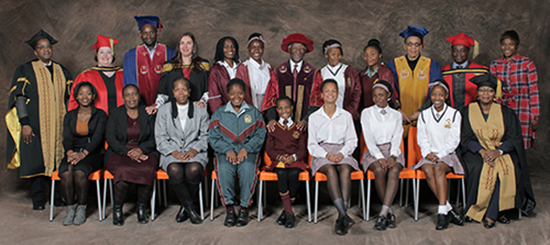News & Events
Engaged Scholarship at Unisa (CSET) – Learner Research Summit
The College of Science, Engineering and Technology (CSET) at Unisa under the leadership of Executive Dean, Professor Bhekie Mamba, often engages with communities to promote science, engineering and technology (SET) as a possible career choice for learners.

The students above are members of the Learner Research Summit project in the College of Science, Engineering and Technology. They attended one of Unisa’s graduation ceremonies in Pretoria and were inspired to further their studies and careers after interacting with professors and Unisa Chancellor Dr Thabo Mbeki.
The college does this in a variety of ways, ranging from community initiatives to activities promoting engaged scholarship. The learner research summit (LRS), now in its sixth year, is one such endeavour. The summit not only aims to promote SET as a possible career choice to learners, but also focuses largely on nurturing learners’ research skills. Learners are given a research theme to work on in collaboration with CSET academics guiding them through the research process. This is done in partnership with educators from the various schools.
This initiative targets learners from Grades 8 to 11. Learners, in collaboration with their educators, highlight their innovative research projects/findings during the annual LRS. After sharing their findings through an oral presentation, the learners prepare a research paper which the college publishes in a proceedings publication (LRS Publication). The LRS not only hone learners’ research skills, but also empowers them to critique each other’s work as was demonstrated by the engaging discussions following the presentations.
The theme for 2017 was Application of Science, Engineering and Technology in an African context. The learners researched a variety of topics relevant to the African continent, such as renewable and sustainable energy, recycling of waste for the benefit of the environment and the community, food and water safety, overpopulation, curbing water wastage and technologies used in curbing crime. They also made the audience aware of technologies used by criminals in their communities. The theme for 2018 is International year of a clean and healthy planet.
In 2017, the Unisa Science Campus hosted the LRS, which attracted more than 300 participants. Secondary schools that participated include Marlboro Gardens, Holy Trinity, Bokgoni Technical, Willow Crescent, Willowmead, Lamola Jubilee, Daliwonga, Flavius Mareka, Saulridge, Tulip, Eldorado Park Secondary and Westbury.
The LRS project, since its inception in 2013 by the then Executive Dean, Prof. Moche, has equipped many high school learners from various communities to become active researchers and prepared them for research in higher institutions. Their involvement in the LRS activities inspires learners and instils in them an interest in science, engineering and technology subjects as useful tools for solving everyday problems and as possible future career directions. In addition, learners come to understand that anyone can make a difference in their own communities, and that research is not the prerogative of institutions of higher learning. Furthermore, learners become critical, analytical and independent thinkers who can solve problems in their communities, thus promoting the concept of transformative teaching and learning.
Novel innovation
One example of a success story of learners benefitting from their involvement in the LRS is that of Moses Mhlwana and Njabulo Sibiya from Bokgoni Technical Secondary School. The learners, who have been participating in the LRS since 2014 and are now in their matric year, were recognised nationally when their invention called the Smart Tank came first out of 500 entries in the Hack4Water Contest. The competition is hosted by the Department of Water and Sanitation in partnership with Open Government Partnership.
Smart Tank, a high-tech system consisting of a water tank and a touchpad, was designed by the learners to curb water wastage in South Africa. The success of this invention has been published in various local magazines and newspapers.
According to the chairperson, Professor Alfred Coleman, LRS wishes to continue inculcating science research practices and methodologies in secondary school learners to solve pertinent problems relevant to the African context. “To achieve this target, we intend to involve many more secondary schools in Gauteng Province, starting with at least ten additional schools in 2018” he says.
The LRS organising committee expressed their gratitude to CSET staff members and the educators from various participating schools for availing themselves every year in September to support learners and throughout the year to assist in mentoring learners.
The project has been enjoying sponsorships from Wimpy, Telkom, Qin-Soft and many other private sponsors. This sponsorship supports the idea of third-income generation and strengthens the partnership between communities, industry and the university.
Those interested to partner with this initiative are welcome to contact Professor Alfred Coleman from Unisa who is the chairperson of the project (Colema@unisa.ac.za).
Click here for the invitation to the 2018 Learner's Research Summit.
Publish date: 2018-08-24 00:00:00.0
